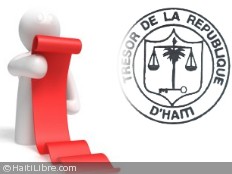 |
Thursday, Jean Baptiste Clark Neptune, the Director General of the Directorate General of Taxes (DGI) announced that 66 large taxpayers were on a red list. The Director stressed that if these taxpayers, whose tax liabilities vary between 1 million and 80 million gourdes, [some did not meet their tax obligations for more than 4 years], do not collaborate with the DGI in order to regularize their situation, they will be prosecuted for tax debts, to the fullest extent permitted by law. Recalling that in Haiti, large taxpayers account for nearly 70% of the tax base.
Friday, Me Jean Renel Sénatus, the Government Commissioner confirmed having received a list of the DGI and explained the legal measures tha the intends to take against these large taxpayers refractory… “[…] The prosecution confirms the receipt of a list that we received from the Directorate General of Taxes, on which there are many taxpayers who do not want to face of their tax charges.
[…] We started to follow, because the law provides in this field, a series of coercive measures that must be considered and put into practice against the persons, called refractory taxpayers, so that we force them to face to their tax obligations.
The law allows us to issue a ban of departure against them. This means that these 66 people can not go to a port, an airport and say they are leaving today. If they do, it means that they fleeing justice and the port and airport authorities must apprehend them and call the Government Commissioner to inform him that such person is in their hands.
There are no games in that ‘Dura lex, sed lex’ (the law is hard, but it is the law). These people are forbidden to leave the national territory. […] Today is Friday, by Monday, I will send a summons to each of these people […] to see if by next Friday, we can make criminal hearings [. ..] the law of 22 August 1983, Article 16 allows us to prosecute these people and we will do, what the law requires us to do […]
I’ll do the duty not to mention the names of these people now, because they will be subject to a hearing and in accordance with Article 11 of the Universal Declaration of human rights, these people have a presumption of innocence […] they can come tomorrow with a receipt and say they they had paid, do not forget that the DGI has several annexes…”
Article 16 : (Law of 22 August 1987)
“In addition, in all cases of perception whatsoever, the General Administration of Taxation may on the occasion of non-payment observed use any other measures deemed efficient such as : publication of the names of latecomers in the newspapers, ban of departure, refusal to accept acts for registration, refusal to approve construction requests made by Engineers, refusal to review the case or the application filed by the Accountant. No contractor can bid for tenders launched by the State, nor will benefit of contracts of the latter if it is not in compliance with the General Administration of Taxation.
The Haitian State may remove the provision of certain services to the taxpayer refractory such as phone subscription and electricity and any contract with the State and this taxpayer will become automatically ‘caduc” upon notice of the Director General of Contributions to Directors of the said institutions. Phone, electricity will be restored on presentation of the receipt establishing the full payment.
The taxpayer refractory that, despite the notice followed by the iterative commandment, will not have paid, may be constrained same by enforcement by committal, to pronounce by the Criminal Court forthwith. The length of the enforcement by committa will be at least three months and up to six months. Even after serving the sentence, the taxpayer remains liable to the State.”
HL/ SL/ HaitiLibre